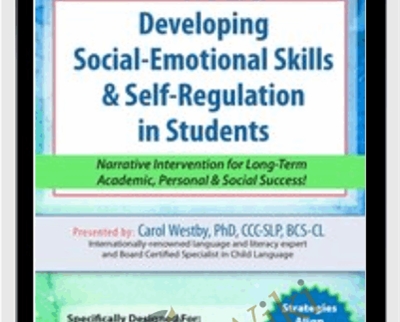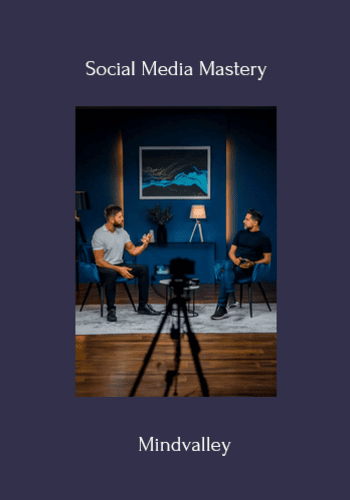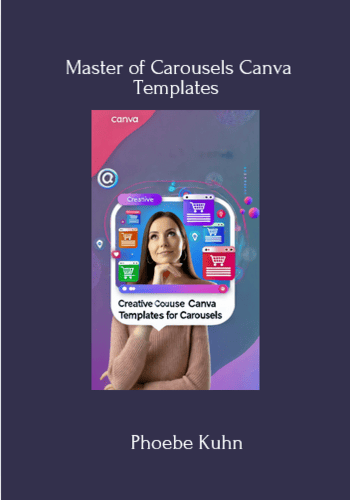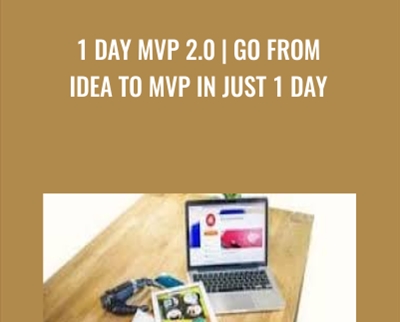Developing Social-Emotional Skills & Self-Regulation in Students: Narrative Intervention for Long-Term Academic, Personal & Social Success! – Carol Westby
Original price was: $219.99.$61.00Current price is: $61.00.
Developing Social-Emotional Skills & Self-Regulation in Students: Narrative Intervention for Long-Term Academic, Personal & Social Success! – Carol Westby …
Salepage link: At HERE. Archive:
The ability to understand the structure of a story and to use this knowledge to share stories benefit students in more ways than one: these skills are critical for long-term academic, personal, and social success.
Don’t miss this chance to learn from internationally-renowned language and literacy expert and Board Certified Specialist in Child Language, Carol Westby, PhD, CCC-SLP, BCS-CL, on how the ability to tell a detailed and coherent personal and fictional story is critical for:
- Engaging in conversations
- Developing and maintaining relationships
- Developing a sense of self and self-determination
- Regulating one’s behavior
- Making informed choices, goal setting, and logical problem solving
In this recording you will learn how personal narratives allow students to understand their own behavior and that of others, thereby developing emotional regulation. You’ll also learn how a student’s sense of self and early narrative emerge through reminiscing about shared experiences.
Carol will teach you techniques and procedures that will support your students’ social-emotional and self-regulation development while meeting the goals set out in the English Language Arts (ELA) Standards. You’ll learn:
- The importance of storytelling to social-emotional development
- The story grammar elements that build organized story retelling
- Techniques to help children recognize mental states in characters, themselves, and others (Theory of Mind)
- How to help students understand a character’s behavior to better predict the consequences of their own actions
- The relationship of identifying setting, plot, and character traits to social-emotional skills, self-regulation, self-identity, and problem-solving
- Procedures to develop the language and vocabulary that express connections between emotions/mental states and actions/events
- How to use scaffolding to support the ability to infer
- Tools that will help you assess and document the development of your students’ narrative structure, coherence, vocabulary, linguistic elements, and progress in meeting state ELA standards
- How to choose specific literature that will trigger reminiscing and reflecting
Elevate your support of students with a variety of language, literacy and behavioral disorders. Purchase this recording today!
- Articulate the relevance of storytelling to the English Language Arts (ELA) state standards and how storytelling meets IEP and curriculum goals.
- Summarize the types of storytelling and their connection to social-emotional development in students.
- Employ tools to assess and document the development of students’ narrative structure, coherence, vocabulary, and linguistic elements.
- Connect the relationships between setting, plot, and character traits to social-emotional skills, self-regulation, self-identity, and problem solving.
- Utilize age-appropriate literature to help students connect emotions/behaviors/mental states of characters to self to promote self-regulation.
- Apply strategies to support inferential thinking by relating emotions and mental states to events.
- Facilitate students’ recognition of characterization, plot, and theme in fictional stories, autobiographical narratives, and life stories.
The Relevance of Storytelling to ELA State Standards
- The 4 related domains of state standards
- Meet IEP goals and interventions while supporting curriculum goals
- Instructional strategies to promote language and literacy skills
The Relevance of Storytelling to Social-Emotional Development
- Support classroom curriculum while meeting students’ needs
- Social-emotional skills
- Self-regulation
- Self-identity
- Self-determination
- Problem solving
Types of Storytelling and Connection to Social-Emotional Development
- Fictional
- Personal/autobiographical
- Life stories
- Cultural variations and impact on narratives
Stages of Narrative Development and Development of “Self”
- Physical – Emotional attachment and shared emotions
- Social – Attention, intention, and communication
- Cognitive – I/You perspective, sense of self, reference to self
- Representational – Talking about the past
- Narrative – Stories of me/others, past/future, worlds outside this one
- Cultural – Stories of us in the world
A Window into a Student’s Ability to Construct a Story
- Rubrics to evaluate narrative structure, coherence, vocabulary, and linguistic elements
- Existing assessment tools and level of scaffolding provided
- Personal, fictional, and life story narratives: Case examples ages 8-20
Strategies to Develop Detailed and Coherent Stories
- Story grammar that builds coherent narratives and elements that affect characters’ behavior and self-regulation
- Ways to help student recognize mental states in characters, themselves, and others (Theory of Mind)
- Connecting emotions/behaviors/mental states of characters to self to promote self-regulation
- Vocabulary and syntax necessary to express connections between mental/emotional states and behaviors/events
- Literature that triggers reminiscing
Strategies to Develop and Integrate Life Stories
- Role of characterization in life stories
- Using biographies/autobiographies to understand characterization
- Identification and development of themes
- Support inferential thinking for “why events occurred” and “why characters reacted”
Here's an overview of the prominent keywords and a list of famous authors:
Business and Sales: Explore business strategies, sales skills, entrepreneurship, and brand-building from authors like Joe Wicks, Jillian Michaels, and Tony Horton.
Sports and Fitness: Enhance athleticism, improve health and fitness with guidance from experts like Shaun T, Kayla Itsines, and Yoga with Adriene.
Personal Development: Develop communication skills, time management, creative thinking, and enhance self-awareness from authors like Gretchen Rubin, Simon Sinek, and Marie Kondo.
Technology and Coding: Learn about artificial intelligence, data analytics, programming, and blockchain technology from thought leaders like Neil deGrasse Tyson, Amy Cuddy, and Malcolm Gladwell.
Lifestyle and Wellness: Discover courses on holistic health, yoga, and healthy living from authors like Elizabeth Gilbert, Bill Nye, and Tracy Anderson.
Art and Creativity: Explore the world of art, creativity, and painting with guidance from renowned artists like Bob Ross and others.
All the courses on WSOlib are led by top authors and experts in their respective fields. Rest assured that the knowledge and skills you acquire are reliable and highly applicable.
Specification: Developing Social-Emotional Skills & Self-Regulation in Students: Narrative Intervention for Long-Term Academic, Personal & Social Success! – Carol Westby
|
User Reviews
Only logged in customers who have purchased this product may leave a review.

Original price was: $219.99.$61.00Current price is: $61.00.












There are no reviews yet.